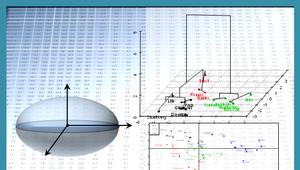MOOC List is learner-supported. When you buy through links on our site, we may earn an affiliate commission.

MOOC List is learner-supported. When you buy through links on our site, we may earn an affiliate commission.
This course is application-oriented; formalism and mathematics writing have been reduced as much as possible while examples and intuition have been emphasized and the numerous exercises done with FactoMineR (a package of the free R software) will make the participant efficient and reliable face to data analysis.
We hope that with this course, the participant will be fully equipped (theory, examples, software) to confront multivariate real-life data.
What you will learn
At the end of this course, you will be able to:
- résumer et synthétiser des tableaux de données par des graphes simples ;
- utiliser des méthodes de visualisation adaptées à l'analyse exploratoire multidimensionnelle ;
- interpréter les résultats d'une analyse factorielle et d'une classification ;
- reconnaître, par rapport à la problématique et aux données, la méthode adaptée à l'exploration d'un jeu de données selon la nature et la structure des variables ;
- analyser les réponses à une enquête ;
- mettre en oeuvre une méthode d'analyse de données textuelles
- mettre en oeuvre les méthodes factorielles et de classification sur le logiciel gratuit R
En résumé, vous serez autonome sur la mise en œuvre et l'interprétation d'analyses exploratoires multidimensionnelles.
To whom is this course addressed?
This course will be held in English. It has been designed for scientists whose aim is not to become statisticians but who feel the need to analyze the data themselves. It is therefore addressed to practitioners who are confronted with the analysis of data in marketing, surveys, ecology, biology, geography, etc.
Suggested Readings: Exploratory Multivariate Analysis by Example Using R (Chapman & Hall/CRC Computer Science & Data Analysis)
Course Schedule
Week 1. Principal Component Analysis
- Data - Practicalities
- Studying individuals and variables
- Aids for interpretation
- PCA in practice using FactoMineR
Week 2. Correspondence Analysis
- Data - introduction and independence model
- Visualizing the row and column clouds
- Inertia and percentage of inertia
- Simultaneous representation
- Interpretation aids
- Correspondance Analysis in practice using FactoMineR
Week 3. Multiple Correspondence Analysis
- Data - issues
- Visualizing the point cloud of individuals
- Visualizing the point cloud of categories - simultaneous representation
- Interpretation aids
- Multiple Correspondance Analysis in practice using FactoMineR
Week 4. Clustering
- Hierarchical clustering
- An example, and choosing the number of classes
- Partitioning methods and other details
- Characterizing the classes
- Clustering in practice using FactoMineR
Week 5 : Multiple Factor Analysis
- Data - issues
- Balancing groups and choosing a weighting for the variables
- Studying and visualizing the groups of variables
- Visualizing the partial points
- Visualizing the separate analyses
- Taking into account groups of categorical variables
- Taking into account contingency tables
- Interpretation aids
- Multiple Factor Analysis in practice using FactoMineR
MOOC List is learner-supported. When you buy through links on our site, we may earn an affiliate commission.
MOOC List is learner-supported. When you buy through links on our site, we may earn an affiliate commission.
